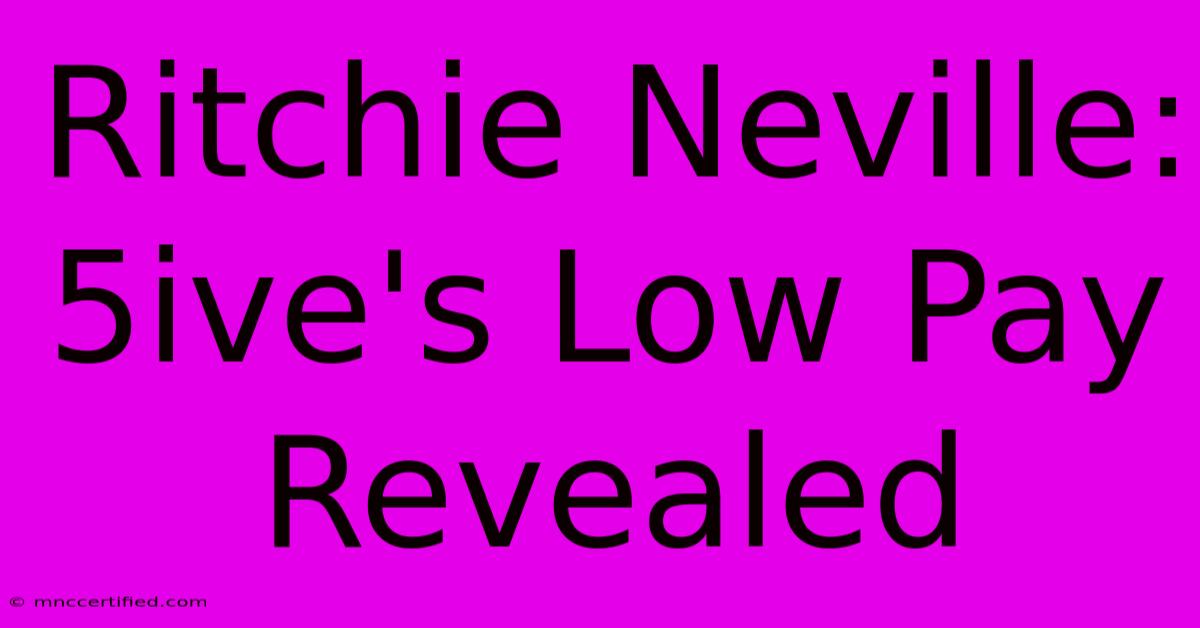Ritchie Neville: 5ive's Low Pay Revealed

Table of Contents
Ritchie Neville: 5ive's Low Pay Revealed - A Pop Star's Struggle
The shimmering world of 90s boy bands often masks a harsh reality. While fans were captivated by 5ive's catchy tunes and energetic performances, the financial realities for band members, particularly Ritchie Neville, paint a less glamorous picture. Recent revelations have shed light on the surprisingly low pay received by members of the hugely popular group, sparking conversations about exploitation in the music industry and the often-hidden struggles faced by even the most successful artists.
The Glimmering Stage and the Grim Reality: 5ive's Financial Landscape
5ive, a powerhouse of the late 90s pop scene, achieved phenomenal success. Their infectious hits dominated the charts, and their concerts drew massive crowds. However, the band members' financial rewards didn't always reflect their widespread popularity. Reports suggest that individual earnings were significantly lower than the public might assume, especially for a band generating such considerable revenue. This discrepancy highlights a common issue within the music industry: the complex web of contracts and management deals that can leave artists underpaid and vulnerable.
Ritchie Neville's Experience: A Case Study
While precise figures remain largely undisclosed, accounts paint a picture of significantly less lucrative compensation than many would imagine for a member of such a famous group. Ritchie Neville's experience serves as a potent example of the potential disparities between public perception of success and the financial reality for those involved. This disparity underscores the importance of transparency and fair compensation in the music business. Understanding Ritchie's situation offers a valuable insight into the complexities faced by artists navigating the often opaque world of music industry contracts.
The Hidden Costs and Complexities of Boy Band Success
The financial realities of being in a boy band are rarely straightforward. Beyond the initial investment by record labels, there are significant costs involved in maintaining a band’s image, producing albums and music videos, and funding extensive tours. These substantial expenses, coupled with complex revenue-sharing agreements, can drastically reduce the individual earnings of each member.
The Role of Management and Record Labels
The power dynamics between artists, management companies, and record labels play a crucial role in determining the financial outcomes for band members. Negotiating favorable contracts is paramount, yet young, inexperienced artists often lack the leverage to secure fair deals. This imbalance of power can lead to situations where artists, despite their popularity, receive only a fraction of the profits generated from their music and performances. The experience of Ritchie Neville, and other 5ive members, highlights the vulnerabilities artists face when navigating these intricate relationships.
The Broader Implications: Fair Compensation in the Music Industry
Ritchie Neville's story is not unique. Many artists, particularly those starting out in their careers, face challenges in securing fair compensation for their work. This situation calls for a greater focus on transparency and ethical practices within the music industry. The story underscores the need for better protection for artists and stronger advocacy for fair contracts and revenue-sharing models.
Advocating for Change: A Call to Action
The revelations surrounding 5ive's low pay serve as a wake-up call. It highlights the need for improved transparency and fairer practices within the music industry to protect artists from exploitation. This calls for strengthened artist rights, improved industry regulations, and a greater focus on fair compensation for musicians at all levels of success. The story of Ritchie Neville and 5ive serves as a crucial lesson about the need for fair contracts and financial awareness in a highly lucrative yet often exploitative industry.
Conclusion: Beyond the Glitter and Glamour
The seemingly glamorous world of pop music often masks considerable financial challenges for the artists. The case of Ritchie Neville and 5ive's low pay reveals a stark reality that sheds light on the vulnerabilities of young artists navigating the complex landscape of the music industry. It underscores the urgent need for change, promoting fair compensation, transparency, and ethical practices to ensure artists receive their due recognition and reward for their talents and hard work. The continued discussion about these issues is crucial for creating a more equitable and just environment for musicians of all levels.

Thank you for visiting our website wich cover about Ritchie Neville: 5ive's Low Pay Revealed. We hope the information provided has been useful to you. Feel free to contact us if you have any questions or need further assistance. See you next time and dont miss to bookmark.
Featured Posts
-
Kemper Life Insurance Greenwood Ms
Nov 17, 2024
-
Husan Longstreet Usc Texas A And M Qb Battle
Nov 17, 2024
-
Final Score Georgia Beats Tennessee Football
Nov 17, 2024
-
Jon Kenny Father Ted Actor Dies Aged 66
Nov 17, 2024
-
Arkansas Football Razorbacks Vs Texas Live Score
Nov 17, 2024